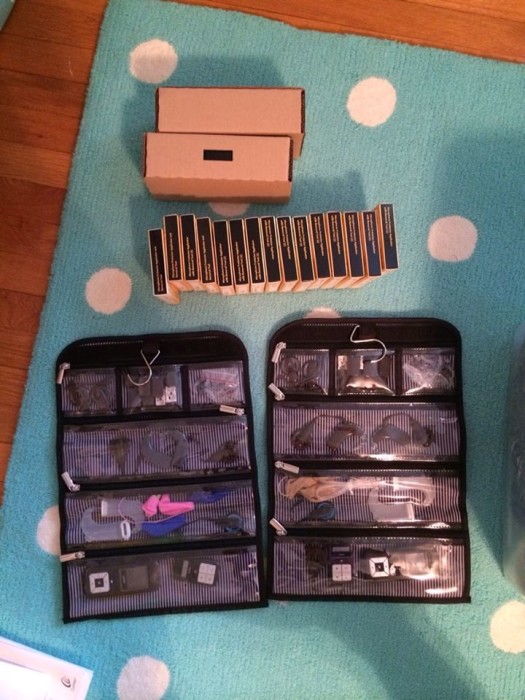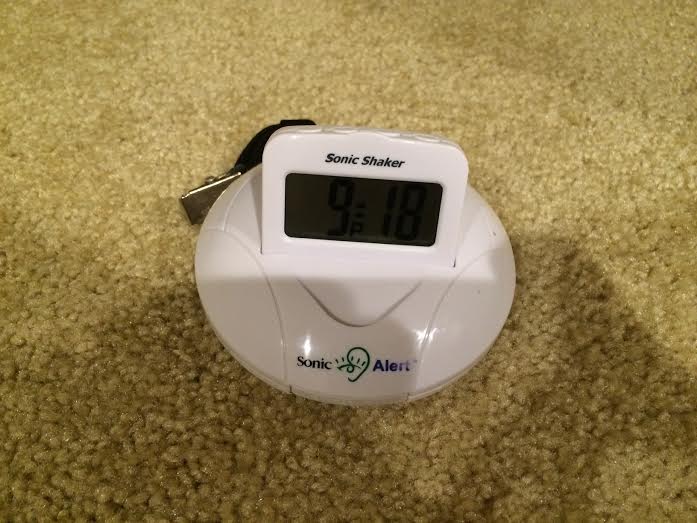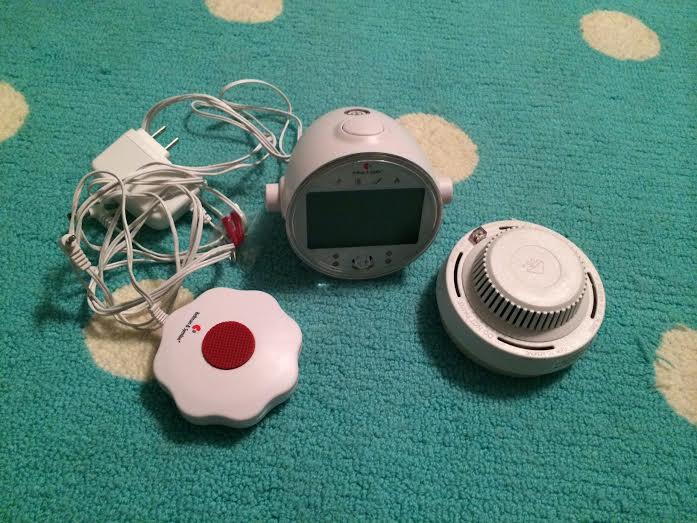September 8th, 2014 by Rachel | Tags: Peace Corps | No Comments »
Climb every mountain,
Search high and low,
Follow every highway,
Every path you know.Climb every mountain,
Ford every stream,
Follow every rainbow,
‘Till you find your dream.A dream that will need
All the love you can give,
Every day of your life
For as long as you live.– Sound of Music
It’s too hard to believe. Really. After spending more than a year in climbing up and down on many mountains to finally be where I longed dreamed to be, the big journey is actually commencing tomorrow. As I look back on my long application process for Peace Corps, I reminiscent the triumphs and frustrations. Being medically cleared and receiving the invitation were the highest points of my application journey. Having my first scheduled interviewed cancelled due to Boston being on lock down, hearing no news, and the government shutting down were the lowest points. However, climbing up and down the mountains will still continue during my service and the climb will only get bigger and longer. The application process taught me to be patient and continue to be persistent, traits that will be important for me to possess during my service.
The night after I first received my invitation last April while vacationing in Santorini, I dreamed that I was sleeping in middle of an African safari all alone and then I was suddenly feeling big shakes and thinking in my dream that animals were running and pounding hard. It turned out that there was actually an earthquake in southern Greece. I remember once I woke up from my dream and the earthquake, I asked myself, “Gosh! My life will be like this in only a few months? Am I ready?” Surprisingly, I am no longer feeling quite nervous or stressed out about the new journey. I’m feeling calm as my mind is fully sinking in that I’m really going on an adventure that I longed wished to be on. However, I am sure that once the plane starts landing in Cameroon, and I see my new home from the air, I’ll be experiencing both high excitements and panic attacks. It’ll be like having a rush of adrenaline.
I am certainly a bit sad to say goodbye to my family. My dad has been giving me hugs every single day for the past two weeks and saying, “I need to hug you while I can because I won’t be able to do it for two years.” My mom’s parents are in town from Florida, and I’ve been trying to spend every minute with them. I saw my dad’s parents and their family a couple weeks ago when I made a quick weekend trip to Toronto. I went to my sister’s college yesterday and said farewell to her. I’ll be making the last rounds of goodbyes tomorrow when my mom and grandmother drop me off at the airport. I’ll miss them dearly. It will be hard not to see them for a long period of time. But I need to allow myself to live to the fullest on day to day basis. I want to live the life where I can feel that my job is a vacation. My definition of vacation is doing an activity which I love doing. What I love doing is living abroad, learning about different cultures, making a contribution to the world and facing challenges. I need to be in a place where I’m feeling happy and thriving.
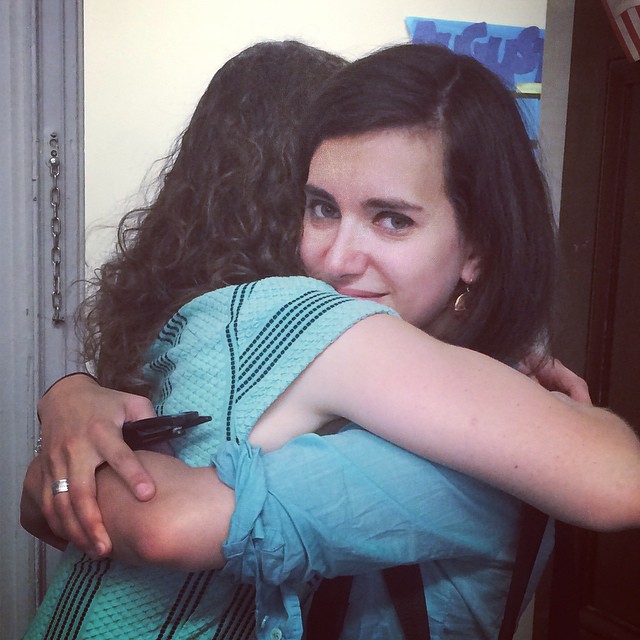
Rachel and Jessica say goodbye to each other.
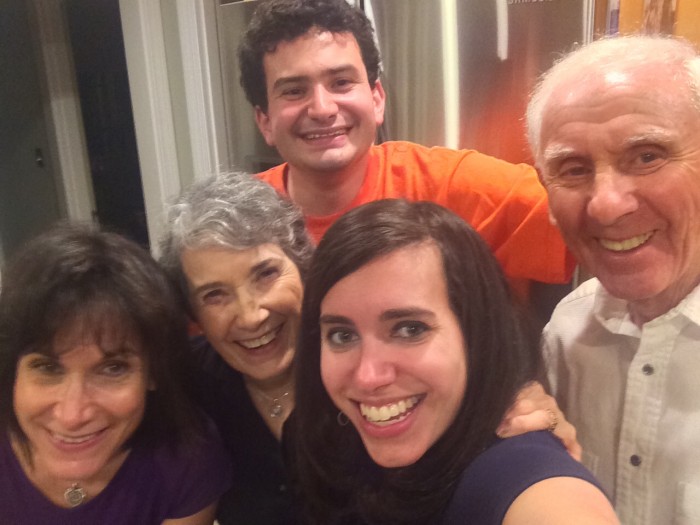
Big family selfie – Me with my mom, brother and grandparents.
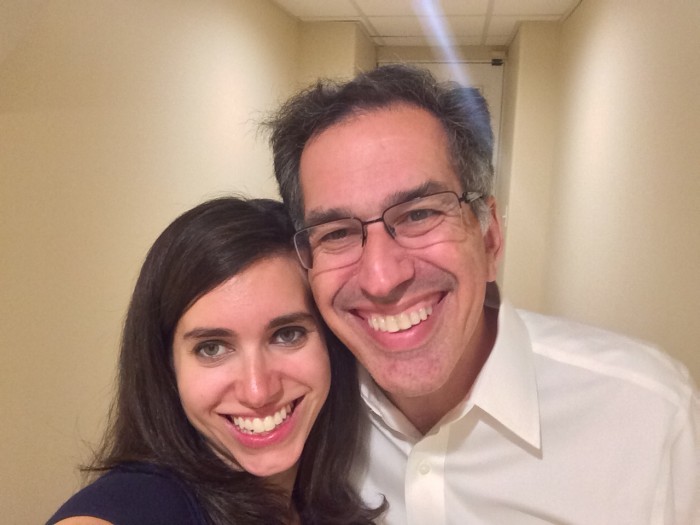
Me with my dad
September 4th, 2014 by Rachel | Tags: #ThrowbackThursday, Peace Corps | 1 Comment »
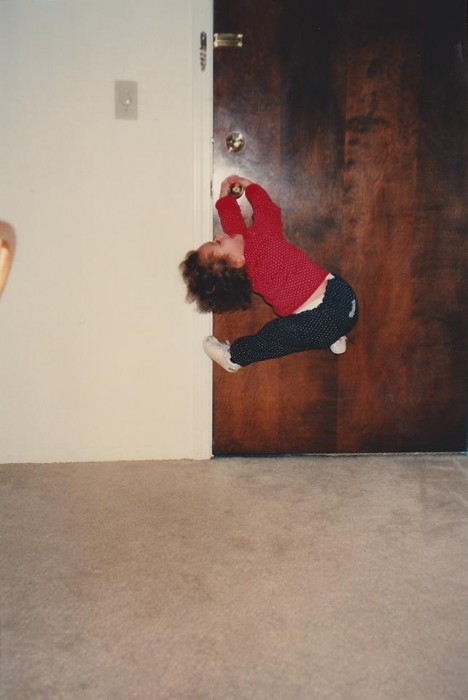
Circa 1989
Bye-bye was my favorite word when I was a kid. Every time my mother said, “We’re going bye-bye” and waved, I would jump up, put my shoes on right away and make a dash for the door. I thrived on being adventurous and exploring the world outside of my home. On weekends, if my parents didn’t have any plans and were not going anywhere, I would moan all day by constantly saying, “I’m bored! I want to go out!” If my parents said they’d go out but at a certain time, I would pester them every five minutes saying, “Is it time yet to go out?” “Is it time to go out yet?” I could never sit still or stay in one room all day. I am the person who always has to be on the move.
In this photo, I was so upset that my mother had said that we were not going anywhere for the day. Because I still didn’t want to listen to her, I became determined that I would still go out by trying to open the door myself.
After all, I was always meant to be an adventurous girl. Who knew that many years later I’d be become addicted to exploring the world and constantly moving to new places?
September 2nd, 2014 by Rachel | Tags: Peace Corps | 1 Comment »
I have been saying all along that I’m heading to Cameroon but have neglected to give everyone an overview of the country. So few Americans and people from other parts of the world know so little about Cameroon as information about the country is rarely found in travel magazines and in the news. Therefore, I feel that it’s important for me to share facts so that people will understand better about the environment in which I will be living.
Cameroon, which is officially called Republic of Cameroon, is a triangular country that lies in west central Africa, bordered by Nigeria to the west and Central African Republic and Chad to the east. It is known as “Africa in Miniature” because it offers a taste of different climates and cultures and a great geographic diversity. It has deserts, jungles, mountains, savannahs and beaches. It has many of Africa’s iconic animals that we see on almost every cover of books about Africa, which includes elephants, giraffes, gorillas, hipopotami, rhinoceroses, and cheetahs. It is a home to 22.5 million people, making Cameroon the 58th largest country in the world, and over 300 ethnic groups of Bantu, Sudanese and Arab origins. While about 230 different languages are spoken, the official language of the country is English and French. Majority speak French. About half of the population is considered to be animist while about 30 percent are Christian and the rest is Muslim. There are 10 different regions which were once called provinces. Peace Corps volunteers are currently placed in eight of the ten regions. No volunteers are placed in the two northernmost regions due to the Boko Haram situation.
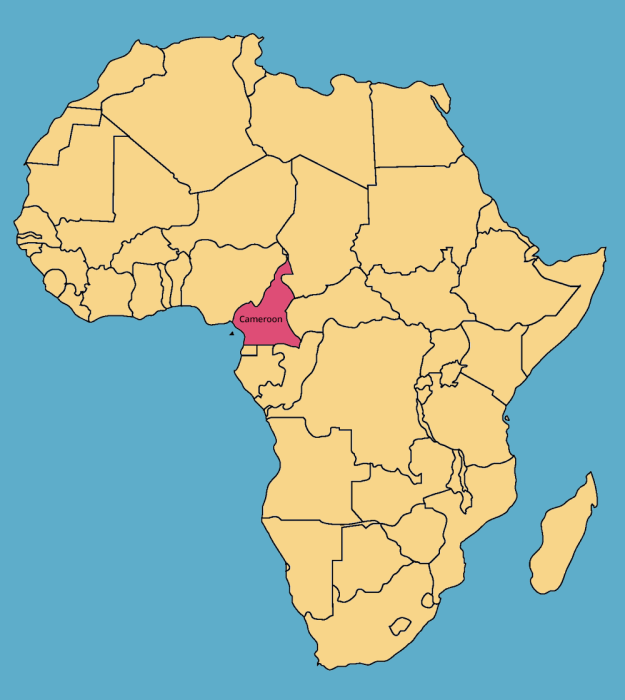
The present day of Cameroon was first settled during the Neolitic period, which is also known as the Iron Age, about 12,000 to 10,000 years ago. The Baka people, an ethnic group who primarily inhabit in the southeastern rain forests of Cameroon and a few other surrounding African countries, is the longest continuing inhabitants. Portuguese sailors then came to the coast of Cameroon in 1472 and discovered an abundant amount of shrimp in a river. Therefore, they named the river Rio dos Camarões, which means Shrimp River and became Cameroon in English. The origin of the country’s name is quite interesting! Then over the following hundreds of years, while more Europeans came to trade with people on the coast, Fula people, an ethnolinguistic group originating from both sub-saharan and north Africa, came to settle in the northern part of Cameroon. This group primarily spoke Fulfulde, which they still speak today. Shortly after Germans tried to colonize Cameroon during the 1800’s and Germany was defeated during World War I, in 1919, Cameroon, which was known then as a region called “Kamerun,” became a territory and was split with the French ruling most of the east side, about 80% of the country, and making their side known as “Cameroun” and the British ruling the west side and making their side known as “Cameroon.” The French area of Cameroon became independent from France in 1960 and then the British area of Cameroon united with the French area in 1961. Today, two of the regions primarily speak English and all the other eight regions primarily speak French. Peace Corps first entered in Cameroon in 1962 with 20 volunteers who worked in math and science education. Since then, more than 3,200 volunteers have served in Cameroon.
Cameroon’s biggest economic source is agriculture and about 80% of the population earn living from farming. Local foods include millet, beans, cassava, yams, plantains, sweet potatoes, avocados, mangoes, fish, and meat. Cameroon is the breadbasket for the region. While the literacy rate of Cameroon is about 77% for males and 59.8% for females, Cameroon has one of the highest literacy rates in Africa. The quality of healthcare is not so great which is why Peace Corps is after all sending volunteers to work in Health and also in Education, Community Economic Development and Youth Development.
August 31st, 2014 by Rachel | Tags: Peace Corps | 1 Comment »
 If you would like to send me letters, postcards or packages, here is the address where to send them:
If you would like to send me letters, postcards or packages, here is the address where to send them:
Rachel Chaikof
Peace Corps Cameroon
Bamenda Regional Office
P.O. Box 837
Mankon-Bamenda, Mezam Division
Northwest Region
Cameroon (PAR AVION)
Many Peace Corps volunteers often say that receiving care packages is one of their highlights of serving in Peace Corps because they give them the comfort of knowing that their family and friends are still thinking about them. Also, when they face homesicknesses, care packages help them alleviate the feeling of missing the American culture. If you love me and are interested in sending me care packages, I will love you forever. Here is a list of suggested items I’d love to receive in a care package:
- Trader Joe’s Cookie Butter
- Trader Joe’s Cookies and Cream Butter
- Fat Witch Brownies
- Cheez Its
- Annie’s Cheese Bunnies
- Chocolate Chip Cookies
- Snickerdoodle Cookies
- Oatmeal Cookies
- Momofuku Cookies
- Annie’s Mac and Cheese
- Chicken Soup
- Clam Chowder Soup
- Cheese (with wax wrap that does not require refrigeration)
- Salmon in cans
- Nature Valley Honey n’ Oats Crunchy Bars
- Apple Sauce
- Parmesan Cheese
- Hand Santizer
- Wipes
- USB loaded with new movies and TV shows *NO DVDS please. I do NOT have a DVD drive.*
- Books sent via Kindle/e-mail
- Pumpkin Pancake Mix
IMPORTANT! I have been told that it’s a good idea to address to me as “Sister” on the package (Sister Rachel Chaikof) and also write biblical quotes and put a cross on the package to minimize the risks of theft. I also advise that anyone who wants to send me a care package to use flat-rate boxes from the United States Postal Service and send packages through USPS. Sending packages through FEDEX or UPS will incur higher custom taxes.
*Also, please check the expiration date before you send food items. Please make sure they do not expire for at least another two to three months.
Even if you just send a card or a written note during my service, I’ll still give you lots of kisses. It will still be nice to know that people back home in America and in other parts of the world are still thinking of me.
I will also still have some internet access in Cameroon to keep everyone updated through my blog.
August 30th, 2014 by Rachel | Tags: Peace Corps | No Comments »
“Life is either a great adventure or nothing.” – Helen Keller
One of the most common blog posts written by Peace Corps Volunteers is about packing and what to bring to their country of service. For my blog post about packing for Peace Corps, I will focus on how the packing experience may be different for people with disabilities, in particular those with hearing loss because I have hearing loss myself. I use cochlear implants, a technology that allows people who are deaf to hear. I hope this post will be beneficial not only for Peace Corps Volunteers who have disabilities but also travelers with disabilities.
When packing, the first question I have to ask myself is: “What items will I need to compensate my disability in everyday life that cannot be found in an ordinary store in most countries?”
As a person with hearing loss, I will need cochlear implant sound processors, rechargeable batteries, hearing aid disposable batteries, microphone protectors, and dri aid kit. Because in most countries I cannot easily replace broken sound processors and the parts, I have to bring extra sound processors and parts to ensure that I will never be off air. Even though cochlear implant manufacturers do have offices throughout the world, it’s not as simple as calling up the nearest office and asking them to ship new parts. There are many factors that can delay the order of replacement parts which includes warranty and health regulations in the country where the office is located. For example, in the US, Cochlear, the company that manufactures my cochlear implants, cannot ship products outside of the US and Canada.
We have to also think about devices that we use exclusively in the home that may not be found in other homes and even in hotels. For instance, I use an alarm clock with a bed shaker instead of an alarm clock that rings sounds because I do not wear my hearing devices when sleeping. Just about any home I visit and most hotels will not have an alarm clock that shakes. This means that I am responsible for bringing my own alarm clock. Fortunately there are portable alarm clocks that shake. They’re very compact and easy to carry. By doing a simple search on Amazon, “travel alarm clocks for hearing impaired,” it will yield a good number of choices of travel alarm clocks. Sonic Alert manufactures a very compact travel alarm clock.
Because the Americans with Disabilities Act cannot be taken with us to other countries, we have to realize that what accommodations hotels can offer us in the US cannot always be offered abroad. For example, in the US, by law, hotels must have some rooms equipped with a strobe light to wake up us, those with hearing loss, at night in case of a fire and a bar in the shower and lower sink for wheelchair users. Even though I will be in the hotel for only a few days in Cameroon, I anticipate that I will still not be able to easily obtain an appropriate alarm system to use any home. In that case, I would need to bring an alarm system that can both detect fire and wake me up. Bellman offers a small and sleek system that includes an alarm clock, smoke detector and bed shaker.
While I should never need electricity to use my hearing devices on daily basis as I can use disposable hearing aid batteries, I still want to have the option of using rechargeable batteries because using them makes the sound processors more waterproof and safer to use in the rain and any water activities. This means that I need to bring solar panels to recharge the batteries because I will be living with inconsistent electricity. This case may be the same for wheelchair users who use powered wheelchairs that require rechargeable batteries.
If I am living in a hot and/or humid climate, it’s incredibly crucial that I bring a dri aid kit or any kind of dehumidifier device for my hearing devices so that all the moisture from humidity and sweat can be removed. Because I will not be able to replace my hearing devices easily, bringing a dri aid kit is even more important to ensure that my hearing devices are fully protected. Dri aid kits are beneficial for anyone who uses not only cochlear implants and hearing aids but any electronic devices that you need to use to be able to function in life. I normally purchase a dri aid kit called “Zephyr” from Dry and Store.
Because I have mild night vision issues, meaning that I do not see well at night where there are very little to no lights, I need to bring flashlights to help me see at night. I am bringing not only an ordinary flashlight but also a headlight and a flashlight that can be powered by cranking to ensure that I am well covered for the night. Those who are legally blind would likely need to bring a white cane and a spare in case one gets stolen.
Like any other Peace Corps volunteers, I’ve packed clothes, shoes, electronics, toiletries and medicines.
Republished on Peace Corps Passport
